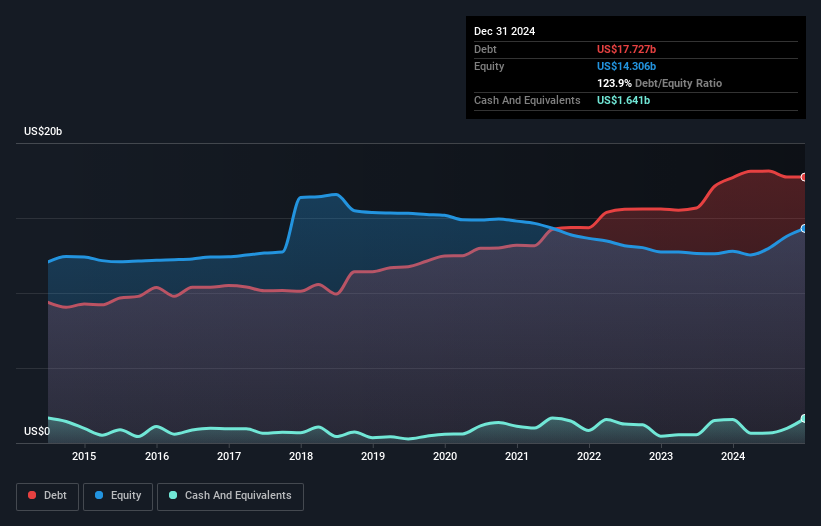- United States
- /
- Transportation
- /
- NYSE:NSC
We Think Norfolk Southern (NYSE:NSC) Is Taking Some Risk With Its Debt
The external fund manager backed by Berkshire Hathaway's Charlie Munger, Li Lu, makes no bones about it when he says 'The biggest investment risk is not the volatility of prices, but whether you will suffer a permanent loss of capital.' When we think about how risky a company is, we always like to look at its use of debt, since debt overload can lead to ruin. We can see that Norfolk Southern Corporation (NYSE:NSC) does use debt in its business. But is this debt a concern to shareholders?
Why Does Debt Bring Risk?
Debt assists a business until the business has trouble paying it off, either with new capital or with free cash flow. In the worst case scenario, a company can go bankrupt if it cannot pay its creditors. However, a more frequent (but still costly) occurrence is where a company must issue shares at bargain-basement prices, permanently diluting shareholders, just to shore up its balance sheet. Of course, the upside of debt is that it often represents cheap capital, especially when it replaces dilution in a company with the ability to reinvest at high rates of return. The first step when considering a company's debt levels is to consider its cash and debt together.
How Much Debt Does Norfolk Southern Carry?
The chart below, which you can click on for greater detail, shows that Norfolk Southern had US$17.7b in debt in December 2024; about the same as the year before. However, it also had US$1.64b in cash, and so its net debt is US$16.1b.

A Look At Norfolk Southern's Liabilities
According to the last reported balance sheet, Norfolk Southern had liabilities of US$3.55b due within 12 months, and liabilities of US$25.8b due beyond 12 months. Offsetting this, it had US$1.64b in cash and US$1.07b in receivables that were due within 12 months. So it has liabilities totalling US$26.7b more than its cash and near-term receivables, combined.
This deficit isn't so bad because Norfolk Southern is worth a massive US$49.4b, and thus could probably raise enough capital to shore up its balance sheet, if the need arose. However, it is still worthwhile taking a close look at its ability to pay off debt.
See our latest analysis for Norfolk Southern
In order to size up a company's debt relative to its earnings, we calculate its net debt divided by its earnings before interest, tax, depreciation, and amortization (EBITDA) and its earnings before interest and tax (EBIT) divided by its interest expense (its interest cover). This way, we consider both the absolute quantum of the debt, as well as the interest rates paid on it.
Norfolk Southern has a debt to EBITDA ratio of 2.7 and its EBIT covered its interest expense 5.8 times. Taken together this implies that, while we wouldn't want to see debt levels rise, we think it can handle its current leverage. If Norfolk Southern can keep growing EBIT at last year's rate of 15% over the last year, then it will find its debt load easier to manage. The balance sheet is clearly the area to focus on when you are analysing debt. But ultimately the future profitability of the business will decide if Norfolk Southern can strengthen its balance sheet over time. So if you want to see what the professionals think, you might find this free report on analyst profit forecasts to be interesting.
Finally, a company can only pay off debt with cold hard cash, not accounting profits. So we clearly need to look at whether that EBIT is leading to corresponding free cash flow. In the last three years, Norfolk Southern's free cash flow amounted to 23% of its EBIT, less than we'd expect. That weak cash conversion makes it more difficult to handle indebtedness.
Our View
Neither Norfolk Southern's ability to convert EBIT to free cash flow nor its level of total liabilities gave us confidence in its ability to take on more debt. But it seems to be able to grow its EBIT without much trouble. We think that Norfolk Southern's debt does make it a bit risky, after considering the aforementioned data points together. That's not necessarily a bad thing, since leverage can boost returns on equity, but it is something to be aware of. There's no doubt that we learn most about debt from the balance sheet. However, not all investment risk resides within the balance sheet - far from it. To that end, you should be aware of the 2 warning signs we've spotted with Norfolk Southern .
If you're interested in investing in businesses that can grow profits without the burden of debt, then check out this free list of growing businesses that have net cash on the balance sheet.
Valuation is complex, but we're here to simplify it.
Discover if Norfolk Southern might be undervalued or overvalued with our detailed analysis, featuring fair value estimates, potential risks, dividends, insider trades, and its financial condition.
Access Free AnalysisHave feedback on this article? Concerned about the content? Get in touch with us directly. Alternatively, email editorial-team (at) simplywallst.com.
This article by Simply Wall St is general in nature. We provide commentary based on historical data and analyst forecasts only using an unbiased methodology and our articles are not intended to be financial advice. It does not constitute a recommendation to buy or sell any stock, and does not take account of your objectives, or your financial situation. We aim to bring you long-term focused analysis driven by fundamental data. Note that our analysis may not factor in the latest price-sensitive company announcements or qualitative material. Simply Wall St has no position in any stocks mentioned.
About NYSE:NSC
Norfolk Southern
Engages in the rail transportation of raw materials, intermediate products, and finished goods in the United States.
Solid track record established dividend payer.
Similar Companies
Market Insights
Community Narratives





